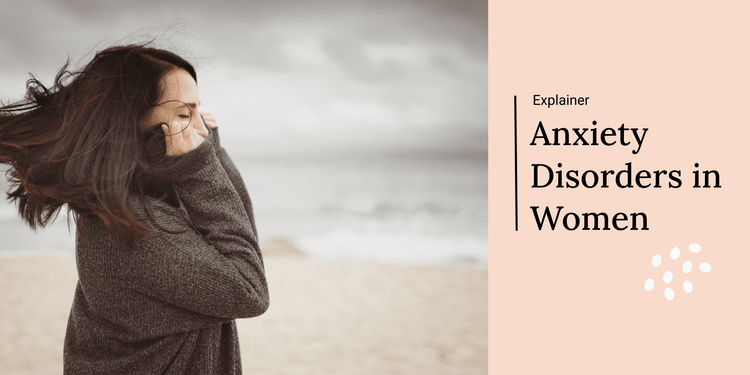
May 10, 2023, 4:00 am UTC
5 min
Created by
Mental Health Check: How to use online screening tools effectively
Listen to this article
Imagine living for a decade with asthma, arthritis, or a thyroid disorder before receiving treatment. It's almost unthinkable. Yet, that is the reality for many people with serious mental health conditions like depression, anxiety, bipolar disorder, and psychosis.
Online mental health screening tools have proliferated, partly to help people get people much-needed help sooner.
These tools are usually short questionnaires about an individual's symptoms and experiences. They may be tailored to a specific mental health condition, such as depression, or a set of conditions, such as eating disorders.
An Internet search will quickly lead a person to an online mental health screening test.
For example, Mental Health America (MHA), a U.S.-based mental health nonprofit organization, offers about a dozen screening tests in English or Spanish, including screens for anxiety, PTSD, post-partum depression, addiction, and attention-deficit/hyperactivity disorder (ADHD). The tests are free, anonymous, and clinically validated, meaning scientific research has shown they effectively identify individuals at risk for specific mental health conditions.
Other organizations, including Psychology Today and mental health charities like the Anxiety and Depression Association of America, offer self-screening tools, too.
"The Internet is one of the most accessible and sought out platforms for mental health research," says Khendra Lucas, a research associate at MHA. "We launched this program in 2014 because we want to meet people wherever they are in their mental health journey and give them an idea of what's going on with their brain without having to worry about barriers to access."
In 2022, more than 6 million people worldwide completed a screen on MHA's website. About two-thirds of them are women, especially women under 25.
If you are considering taking an online mental health screening test, use this guide to learn how it can help you. We also dig into the tests' benefits and limitations, how they should be used, and what to do with the result=
In this guide, we'll cover:
- When to use a mental health screening tool
- Benefits of mental health screening
- Limitations of mental health screening
- How to use mental health screening tools effectively
- What to do with the results of a mental health screening test
How can online mental health screening tools help?
Your mental health is suffering, but are you sad or depressed? Are your distracted thoughts and restlessness signs of anxiety, or could you have ADHD? Are your symptoms mild enough to manage alone, or should you seek professional help? Sometimes it is hard to tell — and even Dr. Google can't come to the rescue.
Enter online mental health screening tools. They do an excellent job of identifying the problem. For example, they can distinguish people who might have a mental health condition such as depression or anxiety and those who probably do not.
Online tools can also help you track your mental health over time and spot changes.
However, keep in mind that online screens do not provide a diagnosis. Compared to psychological assessments, online screening tools are brief; they may not capture the full range of symptoms a person is experiencing. The screening tests are not intended to substitute for a professional evaluation by a family doctor, therapist, or psychiatrist.
What are the other benefits of online mental health screening tools?
In a nutshell, online mental health screening tools offer convenience and accessibility. They are free, anonymous, and available day and night, weekdays and weekends — no matter where you live.
In fact, an independent study showed that the online screening tools offered by Mental Health America are widely used in underserved rural communities in the United States. This suggests they are important tools to bridge care gaps in rural areas where mental health resources may be limited.
Screening tools can also help identify potential mental health concerns early on, leading to earlier intervention and treatment. Early detection is beneficial because it can prevent mental health conditions from worsening and improve treatment outcomes.
Lastly, online screening tools can reduce the stigma associated with seeking mental health care. Research shows that once people have completed a screen, they usually search for more information about themselves and their own mental health.
“Searching for information is generally a positive behavior where people are likely to find information that further propels them to seek treatment, which is a fairly big barrier," says Nicholas Jacobsen, a psychologist and researcher at Dartmouth College. He was involved in a study on the use of digital screening tools in rural areas and another on their real-world effectiveness.
What are the limitations?
Despite the many benefits of online mental health screening tools, some drawbacks exist.
Research by Jacobson and others suggests that online mental health screening tools can effectively identify mental health problems, but their effectiveness can vary depending on various factors, such as how the results are communicated, the population being assessed, and whether follow-up care is provided.
"Mental Health America is doing a wonderful service to the community, but they're one of many, many people trying to provide access to these tools. The variation of things folks are doing has some downstream implications to how helpful the tools are," Jacobson says.
One issue is personalization. Online screening tools are typically standardized; therefore, they may not take into account an individual's unique circumstances or cultural background.
Another is communication. Screening websites vary in how they present results and guide the user. For example, the instruments on Mental Health America's website return a positive or negative result — a "yes" or "no" answer — and may also display a score that indicates whether the condition is mild, moderate, or severe. The results are presented along with links to other articles and resources to help you understand the results and decide what to do next.
However, some websites will tell you whether you screened positive or negative for a mental health condition and nothing more. Others may provide:
- A suggestive diagnosis,
- A message about how to interpret your results,
- Referrals to digital treatments or in-person treatments,
- Information about crisis services.
If the sites recommend further evaluation or treatment, they may not provide access to follow-up care.
Jacobson's research underscores that latter point. His team analyzed the impact of online mental health screening tools on suicidal ideation and suicidal intent, in addition to help-seeking behaviors and care receipt. They found that referrals to in-person treatments were associated with a strong increase in the risk of suicidal intent.
“That was the most striking finding and one of the largest effects we saw,” says Jacobson.
The results don’t explain why, but Jacobson speculates that a lack of timely access to mental health care may be the problem.
“We think what is happening is that folks are probably trying to obtain care and they’re not able to. And so this can really potentially increase the acuity of the idea that they can’t get out or they can’t access something that will help ameliorate their symptoms,” he says.
“Within the United States, it’s very difficult to access care. Waitlists are long and specialized clinics tend to be in metropolitan areas. Most folks with a mental disorder don’t receive care from any mental health provider,” he continues. “This treatment gap could be disheartening to a lot of people and lead them to think about other — incredibly negative — ways to try to cope with their symptoms.”
How to use online mental health screening tools effectively
Before you get started, make sure the online screening tool you intend to use is evidence-based and from a reputable source. Look for screening tools offered by trusted mental health organizations or healthcare providers.
Jacobson recommends researching where the information comes from, just as you should for any advice you read online. “The quality of these sites can vary dramatically,” he cautions.
When completing the screening tool, answer the questions honestly and to the best of your ability. Providing accurate information will help the screening tool give a more accurate assessment of your mental health.
Consider your unique circumstances or cultural background. For example, if you feel that the screening tool is not capturing the full range of your mental health concerns, seek help from a healthcare provider who can provide a more personalized assessment.
What to do with the results
Completing an online mental health screening can be a helpful first step in identifying potential mental health concerns.
Mental Health America recommends sharing your results with a supportive friend, family member, or mental health professional. Other next steps could be:
- Learn all you can
- Learn from people with lived experience
- Get a second opinion
- Get a formal diagnosis and/or treatment
- Test again in a few weeks
"Remember, if you're struggling or frustrated, you are not alone. It takes a lot of determination and education to even go out and seek help," says Lucas. "Or, if you're not ready to seek help, that's fine, too. You have the power to continue to learn more about what you might be experiencing."


